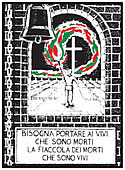THE INVISIBLE THREAD
7/3/2022by Eugenio Battaglia
The TV is full of reports about Ukrainians living in bomb shelters.
These events remind me of my childhood. In Savona, we had the first French naval bombing on the night of 13-14 June 1940, followed by an aerial bombing on 16 June 1940. These are among the first things I remember from of my childhood.
In 1940 we suffered 56 total air raids. There were 9 in 1941, 27 in 1942, and 110 in 1943 (in October the local museum was wiped out and my grandparents lost their house, as did a friend of mine living about a hundred meters from us. There were 1130 attacks in 1944 (practically every day and night), and finally 258 attacks in the first months of 1945.
I was living in the eastern outskirts of Savona. The area was called "Villetta" due to its various villas, plus a few small buildings containing condos with nice gardens and trees. Furthermore, there was a monastery of the Franciscan friars, the Diocesan seminary, a seminary for nuns, a missionary monastery, and finally a military quarter, all with beautiful surrounding land.
In 1942 the first air raid shelter was completed in a very short time not far from my house. Until the gallery was ready we would take refuge in the Franciscan monastery which was surrounded by cultivated land and a small forest.
At first, the gallery was an ugly space, but then we got accustomed to living inside. We made new friends and it was possible to even play, exchange food or books, etc.
Until 8 September 1943 people were holding up fairly well, but after the "Unconditional Surrender" and the start of the civil war, life became even worse. Defeatism arose and people no longer trusted their neighbors. There were political killings on the roads and even in some of the shelters. On 10 October 1944 in Genoa, an entire shelter was blown up, killing 2000 persons. The Office of Strategic Service in Washington DC on 23 November described it as an act of sabotage. Of course, practically nobody in Italy--lay democratic and antifascist--wants to speak about a partisan crime.
Typically, nights were spent inside the gallery. Then in the morning people would go to work or home to try to find and prepare food. Children would go to school, as generally in the morning there was a lull in the bombing.
In the summer we children stayed outside the gallery, playing and waiting for the planes to arrive. We stayed out until the last moment, as the best "game" was to count and recognize the planes. Some knew almost every type of enemy planes. Sometimes the arriving rumble of the planes was very heavy and we knew: no bombs for Savona. When the huge formations were flying rather high, they were heading to wipe out German towns, so we could stay safe outside.
Our antiaircraft batteries, not many and not powerful enough, would try their best to shoot down planes. Quite often a plane that was hit would end up in the sea and many people believed that the report was fake news, but after the war, several planes were found on the bottom of the sea, proving that the gunners were right.
I have already written on the Forum that war or no war, bombing or no bombing, my mother expected me to complete my school homework. To inspire me she would say that this was my contribution to victory. Unfortunately, my small contribution was too small.
Not only me but also my classmates studied very hard. I would say that in 5th grade we knew more about Italian, history, and geography than some university students I met in the mid-1970s.
Oh, by the way about the present situation in Eastern Europe remember, "the first casualty of war is the truth."

